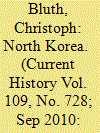| Srl | Item |
| 1 |
ID:
104767


|
|
|
|
|
| Publication |
2011.
|
| Summary/Abstract |
Divergent responses to the sinking of the ROKS Cheonan and the shelling of Yeonpyeong Island in 2010 have raised tensions in Northeast Asia. China's enabling response appeared to write North Korea a blank cheque for further provocations; but Beijing has in fact been constrained by fear of destabilisation of the Kim regime. The incidents have prompted a reappraisal of bilateral relations within the region - in particular, the South Korea-US alliance - and revealed the continuing importance of the Sino-US relationship in Korean peninsular security affairs.
|
|
|
|
|
|
|
|
|
|
|
|
|
|
|
|
| 2 |
ID:
098405


|
|
|
|
|
| Publication |
2010.
|
| Summary/Abstract |
{Adopting} unification as the central goal of policy toward the koreas...would constitute the first step on the road toward a resolution of the crisis on the prninsula.
|
|
|
|
|
|
|
|
|
|
|
|
|
|
|
|
| 3 |
ID:
110524


|
|
|
| 4 |
ID:
108568


|
|
|
|
|
| Publication |
2011.
|
| Summary/Abstract |
Despite constant fluctuations between tensions and detente on the Korean peninsula,
the crisis in 2010, including the Cheonan sinking and the Yeonpyong Island
shelling has proved to become the most dangerous in decades-without obvious
new reasons or new contradictions to justify it. After President Lee Myung Bak's
coming to power in South Korea, Pyongyang developed suspicions over his new
hard-line stance and demands for denuclearization. North Korea thought that
Seoul's call for reforms were merely a cover to undermine their regime and it
took seriously the desire by Southern conservatives for "early reunification" and
thus resorted to military provocations. Meanwhile, the U.S. Obama administration
chose to abstain from any meaningful policy toward North Korea, while China
played a more active role in supporting Pyongyang and Russian policy, which is
based on the priority of peace and stability on the Korean peninsula. All issues
should be decided by political and diplomatic means without the use of force,
threats, pressure, or isolation. Improvements in North-South relations, DPRK
dialogue with the West, and a multilateral format are essential prerequisites for
realizing a new security system in Korea that takes into account the interests of all
parties. Only this can avert a new crisis. The author suggests a return to engagement
and the promotion of slow evolutionary changes in North Korea by giving the
current ruling elite tangible guarantees of security on the condition that the North
would change its domestic and international behavior.
|
|
|
|
|
|
|
|
|
|
|
|
|
|
|
|